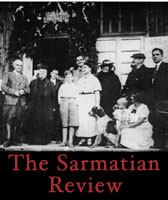
Letters
January 2002
Volume XXII, No. 1
Professor Anna M. Cienciala responds
I regret that Dr. Marek Chodakiewicz responded to my review of Tajne Oblicze GL-AL PPR: Dokumenty (SR, April 2001, 796-800), in a tone more appropriate to a political polemic than a scholarly debate (SR, Letters, September 2001, 828-830). I will not take up all the points he made, for this would take too long, but just those I think are the most important.
Dr. Chodakiewicz rejects my [alleged] "charges that the editors set out to substitute one propaganda stereotype for another" and says: "The documents speak for themselves." As a historian, he should know that this is rarely the case, for the reader must have some knowledge of who is writing to whom etc., and editors often interpret the document for the reader. This is, in fact, the case with most of the documents in Tajne Oblicze that have footnotes, some longer than the document itself.
I hardly "implied that the truth lies in the middle between the communist propaganda of yore and our documentary collection." On the contrary, I acknowledged that Tajne Oblicze shows very clearly how history was falsified in the communist period to create the myth of the GL-AL as the largest and most active resistance movement against the Germans. But I did say that the reader might wonder whether all the GL-AL units were murderous bandits. I also suggested that at least some Polish communists were ideologically motivated, and stated that Wladyslaw Gomulka was not a puppet of Moscow. Dr. Chodakiewicz responds that there were some ideological communists, but they worked "hand-in-glove with common bandits," and this includes Gomulka who knew all about the bands, and also about the NKVD agents in his own [PPR] ranks. He goes on to condemn Gomulka as a "Stalinist" under whose first tenure more independent Poles were killed than under full blown Stalinism; also that he simply failed to adjust to the twists of turns of Stalin's policy (1947-48), but emerged as a non-Stalinist leader when Moscow no longer required the previous servility.
Of course, more than one article could be devoted to different interpretations of Gomulka, but that is beyond the scope of this letter. Let us note, however, that as regards the Gl-AL bandit bands, Gomulka was not in charge of the military arm of the party and that, in any case, many commanders acted on their own. As for the immediate postwar period, it is true that many anti-communist Poles were killed in those years, but we should note that this was a time of virtual war in some parts of Poland. Furthermore, contrary to Raina and Chodakiewicz, historians generally agree that Gomulka was much more independent than the leaders of other "People's Democracies" in the period between 1945-48, except of course for Josip Broz Tito. To interpret his opposition to collectivization in Poland, and then to Stalin's decision to establish the Cominform and to expel Tito as simply a lack of timely adjustment to new Moscow policies disregards Gomulka's insistence on an independent, communist Poland. If this sounds like a contradiction in terms to some, they should bear in mind that Tito succeeded in making Yugoslavia an independent, communist state and that it was recognized as such until its collapse in the 1990s. Finally, Gomulka did stand up to Nikita Khrushchev in October 1956, when the country was threatened by invasion. He won freedom for domestic policy, but what he made of this later is another matter.
I do not "apologize" for my "favorites," as Dr. Chodakiewicz calls Nazarewicz, Turlejska and Madajczyk. I do not cite Nazarewicz's books, but an article of his and I certainly did not require his guidance to write my review of Tajne Oblicze. I point out that though Turlejska was an ideological communist who followed the party line, she later turned against it. But Dr. Chodakiewicz does not believe that people can change, saying they change only their rhetoric. He seems to believe that if a person was once a communist, he or she remains a communist forever, no matter what he/she does or writes.
Chodakiewicz calls Czeslaw Madajczyk "a party hack." I should have said in my review, and do so now, that whatever Madajczyk's politics were before 1989, he is known for his scholarly works on the German occupation of Poland, one of which, Polityka III Rzeszy w okupowanej Polsce: Okupacja Polski, 1939-1945, 2 vols., Warsaw, 1970, is still considered the authoritative work on the subject.
The conclusion to Dr. Chodakiewicz's letter reveals his mindset more than anything else. He writes: "It seems that a liberal-sounding Stalinist is more palatable to Professor Cienciala than the shooting from the hip right-winger Leszek Zebrowski. She cares neither for the reality of nationhood nor for the combative style of the main editor of our volume. That is fair enough. But is it sufficient reason to rely on an ex-UB Colonel as her interpreter of our collection of PPR and GL/AL documents?"
On this I can only comment that, fortunately, most historians do not practice history by "shooting from the hip," for that kind of style belongs not to historical writing but to American Westerns. Furthermore, no Polish historian or politician has a monopoly on interpreting "the reality of [Polish] nationhood."
In conclusion, it is sheer demagoguery on Dr. Chodakiewicz's part to claim that I relied on Nazarewicz to interpret the Tajne Oblicze documents, from which the reader could infer that I am a "liberal-sounding Stalinist" myself. This sort of smear tactic does not belong in the realm of scholarship and is unworthy of anyone claiming to be a historian. For all the above reasons, I do not see any point in continuing this polemic.
Anna M. Cienciala, University of Kansas,
Lawrence, Kansas
Back to the January 2002 issue
The Sarmatian Review
sarmatia@rice.edu
Last updated 1/31/02